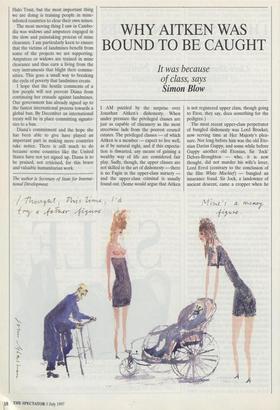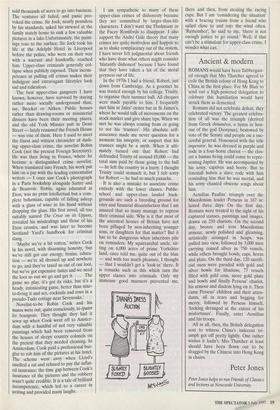WHY AITKEN WAS BOUND TO BE CAUGHT
It was because of class, says Simon Blow
I AM puzzled by the surprise over Jonathan Aitken's dishonesty. When under pressure the privileged classes are just as capable of chicanery as the most streetwise lads from the poorest council estates. The privileged classes — of which Aitken is a member — expect to live well, as if by natural right, and if this expecta- tion is thwarted, any means of gaining a wealthy way of life are considered fair play. Sadly, though, the upper classes are not skilled in the art of dishonesty — there is no Fagin in the upper-class nursery and the upper-class criminal is usually found out. (Some would argue that Aitken is not registered upper class, though going to Eton, they say, does something for the pedigree.) The most recent upper-class perpetrator of bungled dishonesty was Lord Brocket, now serving time at Her Majesty's plea- sure. Not long before him was the old Eto- nian Darius Guppy, and some while before Guppy another old Etonian, Sir 'Jock' Delves-Broughton — who, it is now thought, did not murder his wife's lover, Lord Errol (contrary to the conclusion of the film White Mischief) — bungled an insurance fraud. Sir Jock, a landowner of ancient descent, came a cropper when he sold thousands of acres to go into business. The ventures all failed, and panic pro- voked the crime. Sir Jock, nearly penniless by his standards, asked his steward at the family stately home to sink a few valuable pictures in a lake.Unfortunately, the paint- ings rose to the surface. Sir Jock took his life at the Ade1phi Hotel in Liverpool before the police, who were on their way with a warrant and handcuffs, reached him. Upper-class criminals generally col- lapse when publicly exposed. Their incom- petence at pulling off crimes makes their indulgent and extravagant lifestyles look sad and ridiculous.
The best upper-class gangsters I have known, however, have survived by staying rather more socially underground than, say, Brocket or Aitken. Public houses rather than drawing-rooms or ministerial dinners have been their meeting places, and the old York Minster pub in Dean Street — lately renamed the French House — was one of them. Here I used to meet the finest and wittiest chronicler of dash- ing upper-class crime, the novelist Robin Cook (not the present Foreign Secretary). He was then living in France, where he became a distinguished crime novelist. When translated into French, his work put him on a par with the leading existentialist writers — I once saw Cook's photograph in a Paris bookshop alongside Sartre and de Beauvoir. Robin, again educated at Eton, was no prim intellectual but a com- plete bohemian, capable of falling asleep with a glass of wine in his hand without dropping the glass. His first novel, all too suitably named The Crust on its Uppers, revealed his misdealings and those of his Eton cronies, and was later to become Scotland Yard's handbook for criminal slang. `Maybe we're a bit rotten,' writes Cook in his novel, with disarming honesty, tut we've still got our energy, brains, educa- tion — we're all dressed up and nowhere to go, and they've taxed us out of our loot, but we've got expensive tastes and we need the loot so out we go and get it . . . The game we play, it's got its risks, but it's a heady, intoxicating game, better than nine- to-fiving it and sex, cocktails and rows in a pseudo-Tudo cottage near Sevenoaks.' Novelist-to-be Robin Cook and his mates were out, quite consciously, to epater les bourgeois. They thought they had it sewn up when Cook went off to Amster- dam with a handful of not very valuable paintings which had been removed from the houses of sleepy country colonels on the pretext that they needed cleaning. In Amsterdam, Cook paid a professional bur- glar to rob him of the pictures at his hotel. The scheme went awry when Lloyd's smelled a rat and refused to pay the inflat- ed insurance: the time gap between Cook's insurance of the pictures and the robbery wasn't quite credible. It is a tale of brilliant incompetence, which led to a career in writing and provided many laughs. I am sympathetic to many of these upper-class crimes of dishonesty because they are committed by larger-than-life characters. I don't want the Flashmans or the Facey Romfords to disappear. I also support the Andre Gide theory that many crimes are quite motiveless and happen so as to shake complacency out of the system. I have never felt judgmental about friends who have done what others might consider `blatantly dishonest' because I have found that they have taken a lot of the moral greyness out of life.
In the 1970s I had a friend, Robert, just down from Cambridge. As a gourmet he was trusted enough by his college, Trinity, to organise their summer ball. All cheques were made payable to him. I frequently met him at Jules' oyster bar in St James's, where he would talk of movements on the stock market and give share tips. When we met he was always coming from or going to see his 'trustees'. His absolute self- assurance made me never question for a moment his integrity, or suspect that his trustees might be a myth. When it ulti- mately turned out that Robert had defrauded Trinity of around £8,000 — the total sum paid by those going to the ball — he left the country in a hurry. I thought Trinity could stomach it, but I felt sorry for Robert — he had so much panache.
It is also a mistake to associate crime entirely with the lower classes. Public- school and upper-class landed back- grounds are such a breeding ground for envy and financial dissatisfaction that I am amazed that so many manage to repress their criminal side. Why is it that most of the ancestral houses of Britain have not been pillaged by non-inheriting younger sons, or daughters for that matter? But it has to be dangerous when inheritors pile on reminders. My squirearchal uncle, sit- ting on 6,000 acres of prime Yorkshire land, once told me, quite out of the blue — and with too much pleasure, I thought — that I wouldn't get a `look-in' there. It is remarks such as this which turn the upper classes into criminals. Only my immense good manners prevented me, there and then, from stealing the racing cups. But I am 'considering the situation' with a bracing truism from a friend who sailed close to and into the wind often. `Remember', he said to me, 'there is not enough justice to go round.' Well, if that can't be a stimulant for upper-class crime, I wonder what can.



























































 Previous page
Previous page